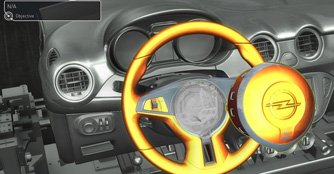Opel to use game consoles in automotive construction
24 Dec 2014|1,480 views
Opel is now bringing game consoles into the real world. In future, employees in production will prepare for new assembly assignments with the help of a Wii controller and a Microsoft Kinect camera.
"We want a system that allows employees to virtually train in a familiar environment," said Frank Arlt who is leading the VISTRA (Virtual Simulation and Training of Assembly and Service Processes in Digital Factories) research project at Opel.
The automotive company initiated the EU-sponsored project three years ago and since then the next generation of virtual training has been researched and developed in Russelsheim. The VISTRA system will be put into practice from 2015.
Apart from Opel, six further research and industrial enterprises from Germany, Sweden, England and Denmark are involved in the EU research project. In total, ten Opel employees are working on the project along with 40 experts from external partners.
Virtual training has many advantages. It is quicker, cheaper and more flexible than learning with reproduced hardware prototypes. An initial evaluation of VISTRA revealed that people trained on the virtual system make less mistakes (down 40 percent) than people trained solely on prototypes. Furthermore, the personalised training ensures that each participant can learn the exact steps of procedure that he/she will utilise during the assembly of a vehicle. In addition, several people can use the system simultaneously and the equipment is light and flexible.
The VISTRA team is currently looking into how efficient the program exactly is in the actual sequence and how it can be integrated in the existing process. Despite all of the advantages, the new virtual system will not replace working on real prototypes completely. Instead, it will complement the current system.
Opel is now bringing game consoles into the real world. In future, employees in production will prepare for new assembly assignments with the help of a Wii controller and a Microsoft Kinect camera.
"We want a system that allows employees to virtually train in a familiar environment," said Frank Arlt who is leading the VISTRA (Virtual Simulation and Training of Assembly and Service Processes in Digital Factories) research project at Opel.
The automotive company initiated the EU-sponsored project three years ago and since then the next generation of virtual training has been researched and developed in Russelsheim. The VISTRA system will be put into practice from 2015.
Apart from Opel, six further research and industrial enterprises from Germany, Sweden, England and Denmark are involved in the EU research project. In total, ten Opel employees are working on the project along with 40 experts from external partners.
Virtual training has many advantages. It is quicker, cheaper and more flexible than learning with reproduced hardware prototypes. An initial evaluation of VISTRA revealed that people trained on the virtual system make less mistakes (down 40 percent) than people trained solely on prototypes. Furthermore, the personalised training ensures that each participant can learn the exact steps of procedure that he/she will utilise during the assembly of a vehicle. In addition, several people can use the system simultaneously and the equipment is light and flexible.
The VISTRA team is currently looking into how efficient the program exactly is in the actual sequence and how it can be integrated in the existing process. Despite all of the advantages, the new virtual system will not replace working on real prototypes completely. Instead, it will complement the current system.
Latest COE Prices
June 2025 | 1st BIDDING
NEXT TENDER: 18 Jun 2025
CAT A$96,999
CAT B$113,000
CAT C$62,000
CAT E$113,900
View Full Results Thank You For Your Subscription.



















